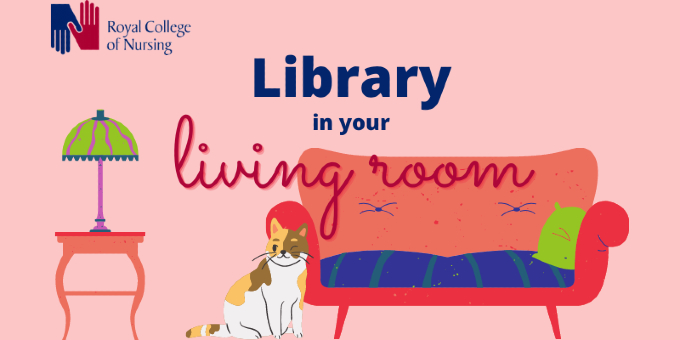The RCN Library and Archive Service has lots of tools to help members gain confidence in using our e-library and make the most of what’s on offer
“We know how busy members are so we want to make sure they can easily find the information they need online,” says Alan Chalkley, RCN Information Literacy Assistant. “This has become even more essential during the pandemic with our library buildings across the UK closed.
“We have an extensive online offer and we want to make it as easy as possible for members to find out what’s available and how to access it.”
With this in mind, the library and archive service offers a range of quick video tutorials. These step-by-step guides show members how to access articles and ebooks, and how to search online databases like CINAHL, the British Nursing Index, and the RCN’s subject guides.
Subject guides
The library’s subject guides are a good starting point for finding out more about different areas in nursing and locating key resources, says Alan. “If you’re starting a new job or a placement in a different specialism, our subject guides can be really useful,” he explains. “You’ll find resources from the RCN and other reputable organisations, as well as ebooks, and we offer ready-made journal searches on relevant topics to get you started.”
Alan says the team works closely with RCN forum steering committees, forum members and the RCN’s professional leads to create the guides and they’re updated regularly to reflect best practice.
There’s also a subject guide for RCN reps, pulling together a range of guidance and resources to support learning reps, safety reps and stewards in their roles.
Useful tools
As well as subject guides, the library and archive service offers members a number of other tools to help you find reliable resources quickly. Through the online platform BrowZine, you can easily browse nursing journals and magazines, from older issues to the present day, or create your own BrowZine account to track your favourites.
A new tool called LibKey Nomad is also helping members save time. Alan says: “When you’re searching for information on other websites, like PubMed or Research Gate, LibKey Nomad shows you which articles are available through the library and you can then access them in one click rather than having to search for them separately on our website.”
Find out more about these tools and how to download LibKey Nomad.
We wanted to do something to help members step back from the challenging situation they're working in
Online events
The library and archive service hosts a range of regular events for members, from nursing history talks, to events tackling current issues or helping members improve their study skills.
As a result of COVID-19, these events have all moved online and the service has also introduced a series of creative workshops titled “Time to…”, giving members the opportunity to take part in activities such as writing poetry, drawing or guided meditation. “We wanted to do something to help members step back from the challenging situation they’re working in,” says Alan.
Another new series is documenting members’ experiences during the pandemic with speakers from a wide variety of health and care settings across the UK. These events, and more, are available to watch again and members can also explore the RCN’s wide range of nursing exhibitions online.
Take a look at the library’s exhibitions and events.
A helping hand
Alan says that although there are many tools to help members use our e-library independently, the team is still on-hand to help. “Members can get in touch using our webchat function or give us a call,” says Alan. “We also offer one-to-one online training sessions, which can be tailored to members’ needs and booked through our website, and weekly drop-in sessions.”
Do you know about our literature search service?
Our literature search service can save you time and support you in your RCN work or nursing career.
Once you’ve submitted a request, our expert literature searchers will use a wide range of databases to find journal articles and publications relevant to your topic and send you the details by email.
Requests for literature searches can be made by completing the form on our website, or by phone, email or webchat. It’s important to clearly describe your subject area including any key words you want to be used, the date range to be searched and the type of materials you need, such as journal articles or books. If you need any help or want to discuss your topic before submitting a request, just get in touch.
This service isn’t available for student members, but we do have a range of resources available to help students and other members in carrying out their own searches. This includes video tutorials, training sessions and our new interactive tool that helps you get the most out of your searches in 10 straightforward steps.
An invaluable resource
Jennifer Foreman shares how the RCN’s literature search service and support from the RCN library team in Northern Ireland has helped her throughout her nursing career

I’ve worked in oncology for the last 18 years in various roles, including as a chemotherapy nurse and in research, and I’ve recently transitioned into a new role as an oncology nurse practitioner. I’ve used the RCN’s library in Belfast since I was a student and always found it to be a fabulous resource.
Since qualifying, I’ve made good use of the library’s literature search service – it’s supported me in my clinical role and in all the further training I’ve undertaken, such as my MA and most recently in non-medical prescribing.
I’ve also found it a really useful resource to support me in my role as a practice assessor and supervisor. When I’m preparing induction packs for newly qualified nurses and students, I use the literature search service to help me review the information and make sure it’s up to date.
When you’re writing something, you do have to factor in a lot of time for research before you even sit down and start to write. This is where the service can really help and save you valuable time. It’s also helpful to be able to speak to experts about what you’re looking for.
One of the main benefits of the library, is the huge range of nursing-specific materials available
My advice is to make sure you have a really good idea about what you want before you submit your request and if you need help with this, contact the library team. Look at the words associated with your topic and think about what the term might mean in other parts of the UK or further afield. Try to refine your search by time period and think about the types of materials you want to find.
One of the main benefits of using the RCN’s library, is the huge range of nursing-specific materials available. This shows in the literature search results.
At times, I’ve had trouble finding or accessing certain resources through a university library because they cover such a broad range of subjects.
Although you have institutional access, it’s not as comprehensive as the RCN’s collections. There’s also a huge student population to compete with. Having that one-to-one service from RCN library staff with specialist nursing knowledge makes such a difference.
Picture of Jennifer by David Gee
More information
To find out more about all of the resources mentioned in this article, visit our library webpages.









